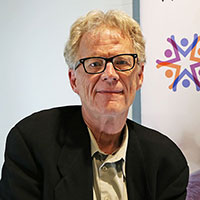Why Mindfulness Matters, Especially Now

“ . . . the powerful moment we’re in right now is enough.”
An interview with Chuck Schad, mindfulness facilitator, Wheeler, reveals why the practice of mindfulness is an effective approach to managing physical and mental health concerns, especially when coupled with existing behavioral health and primary care services. Mindfulness is one of several complementary medicine services available to Wheeler consumers through our community health center at 43 Woodland Street.
Watch the video interview with Chuck.
Q&A Interview:
What is mindfulness?
Mindfulness is the ability to sit without judgement and watch what’s happening to you instead of constantly comparing, constantly evaluating. So, for example, if you have an anxious thought, instead of doing what you always do, which is to get more nervous, or struggle to avoid that feeling, mindfulness allows you to say, “Here’s some anxiety, I’m observing it,” instead of reacting to it.
Every day, between 60,000 and 70,000 thoughts run through our head, and there are usually a handful of persistent ones. Mindfulness allows you to step back, gives you some space, to process things in a new way. Your life stops being a constant struggle of running away, while trying to manage whatever is bothering you. You’re here, that’s all you’re going to be. You’re here, and the powerful moment we’re in right now is enough.
Many of us now find ourselves in situations of social isolation and quarantine. Our work and routines have changed, causing all kinds of “busy-ness” in our heads. You may have more time to think, review past grievances, or fret about what will happen next. Mindfulness helps to curb the worry. As a result, you’ll be calmer, more peaceful.
How is mindfulness used?
We use it for relaxation and several medical conditions, including diabetes and hypertension, as well as for behavioral health concerns, such as anxiety, or addiction. It’s a strong supportive discipline to the behavioral health and primary care services already offered at Wheeler and is flexible enough to address whatever it is that you’re struggling with. The cumulative effects are very positive.
How does mindfulness help people?
Mindfulness changes the relationship between you and what you are struggling with, no matter what that is. It shows us that we all have the power to look at our particular situation in a non-judgmental, non-reactive, non-compulsive manner. So, instead of succumbing to it, you’re in control of it, which puts you in a space where you can make better decisions.
Why is the practice of mindfulness so critical now?
Mindfulness is important, particularly now, because we are all living in fear of the future – what it will look like, how we will be affected. Mindfulness helps you to understand that if you can remain calm in the present, you can achieve the clarity and resolve needed to meet any challenges you may need to face. Simply put, you will be in a better frame of mind to change your life.
Will mindfulness work right away?
Mindfulness is a skill like any other. It takes practice for it to enrich every aspect of your life. However, many people are surprised at the benefits reaped with just several sessions. You can quickly learn to identify and understand your thoughts, especially the persistent ones, and these thoughts ultimately lose their power. It’s a different way to live!
How can people carve out space for mindfulness, as routines change, and family pressures increase?
The best advice I can give about practicing mindfulness is to just do it. Do it as if your life depended on it. Even for 10 minutes to start. You will quickly see how refreshing it is for your brain to have a break from the incessant noise. You can do it anywhere – no need for cushions and candles. Do it sitting in your backyard, strolling in a park, watching the sunset. This is a great time to say, “I’m going outside for 10 minutes. My job right now is to relax and observe. Everything will be better when I come back!”




